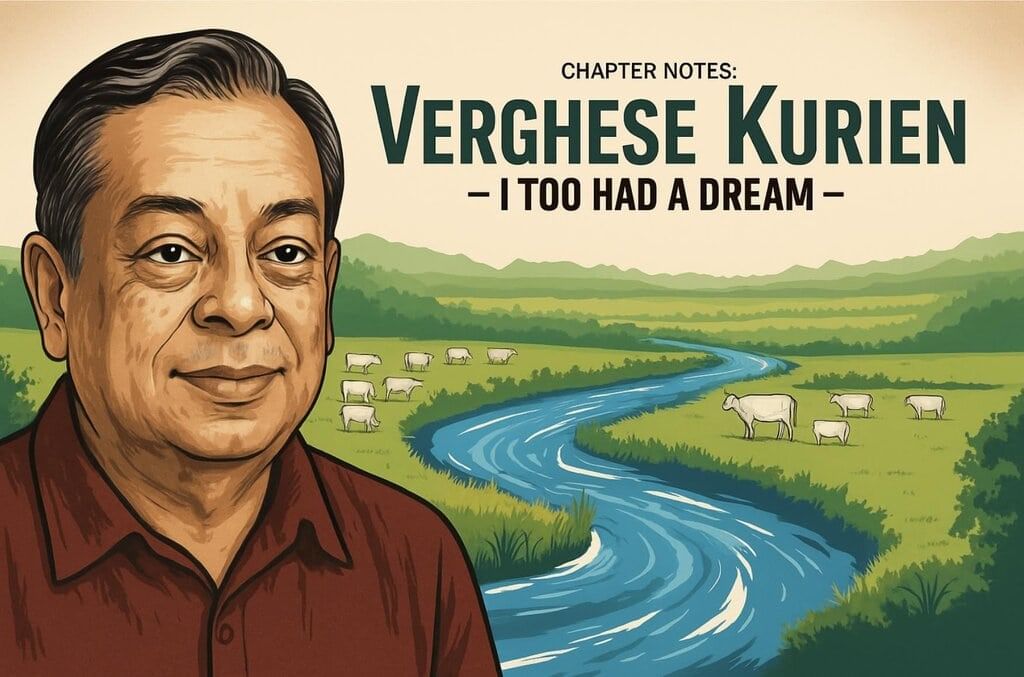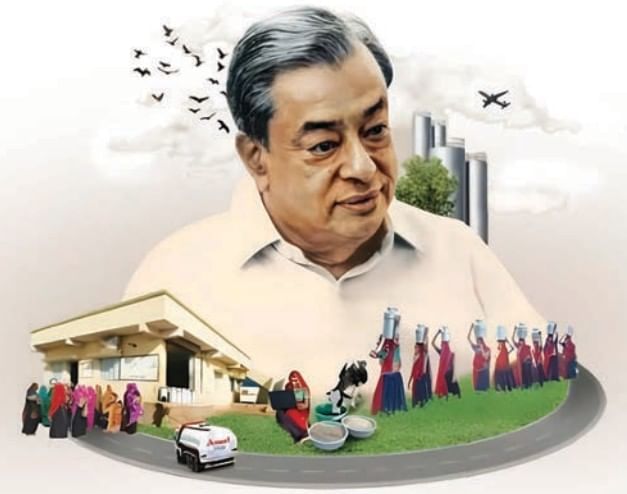Verghese Kurien — I Too Had A Dream Chapter Notes | Chapter Notes For Class 8 PDF Download
| Table of contents |

|
| Introduction |

|
| Key Points of the Story |

|
| Detailed Summary |

|
| Theme/Message |

|
| Difficult Words |

|

Introduction
In the letter “To My Grandson,” Dr. Verghese Kurien—fondly known as the "Milkman of India" and the "Father of the White Revolution" in India writes to his young grandson, Siddharth. Through this heartfelt message, Kurien reflects on his life choices, his values, and the journey that led him to serve the farmers of India. He shares the importance of responsibility, hard work, and making meaningful contributions to society. This letter is more than a personal note—it is a guiding light meant to inspire not only his grandson but all young people to build a better future for India.
Key Points of the Story
- The letter is written by Dr. Verghese Kurien to his grandson Siddharth in 2005.
- He expresses how letters are more lasting and meaningful than phone conversations.
- Kurien explains his life choices and why he chose to serve India’s dairy farmers.
- He gave up attractive career options in the army, metallurgy, and foreign jobs to work in Anand, Gujarat.
- His wife supported his decision despite the hardships of village life.
- Kurien highlights the importance of values like integrity, honesty, responsibility, and service to others.
- He stresses the need to use one’s talents for the common good and help others every day.
- He explains that real failure is not trying your best, not a lack of success.
- Kurien shares life lessons about happiness, humility, and being content with what you have.
- He recalls a special moment when his grandson held his Padma Vibhushan medal, reminding him to earn his recognition through service.
- The letter ends with a beautiful wish: for Siddharth and his generation to be brave, wise, and generous, and to dedicate their lives to the greater good of the country and humanity.
Detailed Summary
This story is a real letter written in 2005 by Dr. Verghese Kurien, the “Milkman of India,” to his grandson Siddharth. Dr. Kurien is the man who helped make India the world’s largest milk producer. In this letter, he shares his life story, values, and advice in a warm and loving way.
At the start, Dr. Kurien explains why writing letters is special. Phone calls or messages give only quick happiness, but letters can be read again and again. He hopes Siddharth will treasure his words in the future and understand why he chose a life of service to farmers.
He recalls that when he was young, India had just become free. He too wanted to help build a strong, hunger-free India. Though he could have chosen big careers—like becoming an army general, a business leader, or moving to the USA—he decided to work with poor dairy farmers in Anand, Gujarat. This was not easy, but it became the most meaningful work of his life.
Dr. Kurien also praises Siddharth’s grandmother, who supported him even though Anand had very few comforts in those days. Her strength helped him continue his work. He says any success he got, like awards, was possible only because of the people around him.
He highlights the importance of values—especially honesty and integrity. He tells Siddharth that life is a privilege and should not be wasted. We must take responsibility, use our talents well, and always try to help others. Failure, he says, is not about losing but about not giving your best or not doing good for others.
Dr. Kurien reminds Siddharth that life is not perfect. Everyone faces problems, even if they don’t show them. Instead of comparing ourselves with others, we should be thankful for what we have.
He shares a memory from 1999, when he got the Padma Vibhushan award. Young Siddharth wore the medal and asked to keep it. Dr. Kurien told him that it belonged to him too—but more importantly, Siddharth should earn his own recognition through his work.
The letter ends with a message: if we are loving, kind, and share happiness with others, then we will live a good life. He dedicates this letter not only to Siddharth but to all children of the next generation, hoping they will work hard for the good of India and the world.

Theme/Message
Theme
The main theme of the letter is living a meaningful life based on values, service, and responsibility.
It shows how choosing service to farmers over wealth or status can bring true satisfaction.
It stresses integrity, honesty, gratitude, and compassion as guiding principles.
It highlights that true success lies in contributing to the common good rather than personal gain.
It also reflects on love, support from family, and sacrifice as the foundation of a purposeful life.
Message
The message Dr. Kurien gives his grandson (and future generations) is:
Life is a privilege – do not waste it; use your talents wisely.
Integrity is the key – be honest with yourself, then you can be honest with others.
True success = service – the real reward in life comes from helping others and working for the greater good.
Failure is not trying – failure means not putting in your best effort, not about losing.
Happiness is perspective – don’t compare with others; be thankful for what you have.
Love and kindness matter – if you are loving, strong, and generous, you will have lived a good life.
Difficult Words
addicted: dependent on something
fleeting: lasting for a very short time
abiding pleasure: a happiness that continues for a long time
jottings: brief notes
foremost: leading; most important
humility: modesty; not thinking you are better than others
pursue: to follow or strive for something
envisioned: imagined or thought of for the future
ardently: in a way that shows strong feelings
poise: calm and confident manner
adhered: stayed loyal to; followed closely
integrity: honesty and strong moral principles
correlation: a connection or relationship between two or more things
musings: careful thoughts over a long time
treasure: to value or keep something as very special
equitable: fair and equal for everyone
privileges: special advantages or rights
contributions: something given or done to help a cause or group
common good: something that benefits everyone
cherish: to value or hold something dear
modestly: in a simple or humble way
rejoice: to feel or show great happiness
periphery: the edge or outside part of something
luminary: an important or famous person in a particular field
FAQs on Verghese Kurien — I Too Had A Dream Chapter Notes - Chapter Notes For Class 8
| 1. What is the significance of Verghese Kurien's contributions to India's dairy industry? |  |
| 2. How did Kurien's vision impact rural development in India? |  |
| 3. What challenges did Verghese Kurien face while implementing his ideas? |  |
| 4. What are some key lessons from Kurien's life and career that can inspire future entrepreneurs? |  |
| 5. How does the story of Verghese Kurien align with the themes of self-reliance and empowerment? |  |
















